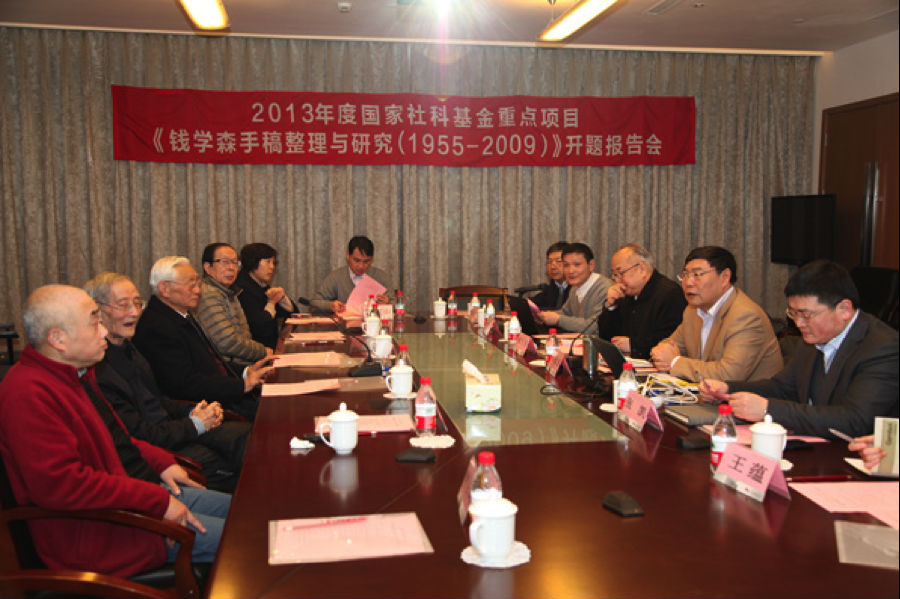Opening Report of the Sorting and Researches of Qian Xuesen’s Manuscripts
2014年01月16日
On the afternoon of Jan.16, the opening discussion meeting of the key project of 2013 National Social Science Fund---Sorting and Researches of Qian Xuesen’s Manuscript (1955-2009) was held in B22 Conference Room of Qian Xuesen Library. Professor Zheng Chengliang, Executive Librarian of Shanghai Jiaotong University Qian Xuesen Library, was the chief expert of the meeting. Zhang Guangjian, Researcher of Shanxi Academy of Social Sciences, was the leader of the expert team which included: Professor Xia Jun, former Vice President of the Party School of Shanghai Municipal Party Committee, Professor He Yunfeng, Director of the Publicity Department of Shanghai Normal University, Senior Colonel Gu Jihuan, Qian Xuesen’s former secretary, Wang Huanchen, Professor of Shanghai Jiaotong University Antai Economics and Management College, Professor Jiang Xiaoyuan, Director of the Research Institute of Science History and Scientific Culture, Sheng Yi, Director of the Department of Party History and University History Research. The meeting was presided by Professor Ye Bifeng, Director of the Culture and Science Construction Department of Shanghai Jiaotong University.
Ye Bifeng expressed congratulations to the establishment of the project on behalf of Shanghai Jiaotong University and the Culture and Science Construction Department. He also expressed sincere thanks to the experts for coming. He said that the university will spend no effort to support this project. Wang Yun from the Philosophy and Social Science Planning Office of Shanghai attended the meeting and delivered a speech, congratulating on the establishment of the key National Social Science Fund project and indicating that they would fully support the promotion of the research achievements.

On behalf of the research group, Zheng Chengliang explained the overall implementation plan of the project in terms of project declaration and establishment, research value, research subject and key points, expected result, division of labor and time nodes. Taking previous sorting and researches into consideration, Zheng Chengliang pointed out that sorting Qian Xuesen’s manuscript could not only enrich the materials for the study of Qian Xuesen’s life experience and thoughts, but also deeply explore the essence of his ideas. He said that the project was an integration of sorting and researching, collecting and using as well as maintaining and developing.
Zhang Kai, Shi Guiquan, Zhang Xianmin and Wang Changming, who were in charge of the sub-projects, reported the preliminary plan and approaches for the sorting and research of Qian Xuesen’s comments, manuscripts, correspondence and notes.
After assessment and discussion, the experts agreed: the research group had made sufficient preparation; after the establishment of the project, the group divided works according to the four major types of Qian Xuesen’s manuscripts (comments, manuscripts, correspondence and notes); the sorting and research plan of sub-projects had clear goals and ideas; the research was equipped with rich contents, scientific approaches and a research team with reasonable structure. Therefore, the plan was considered to be feasible and could be put into the implementation stage.
In the meantime, the experts also provided suggestions about the possible problems which might occur during implementation: we should make good plan for sorting and researching, focusing on sorting in earlier stage and on the combination of sorting and researching in later stage, and highlighting the academic nature of sorting through researching; as for the purpose of sorting, we should use index, contents, introduction and other approaches to facilitate researchers for using the materials. The experts also mentioned the extensibility of the project, suggesting that we should use the project as a prelude of editing Qian Xuesen Collection in the future, and accumulate experience through this project. He suggested that we could even consider to build a "Qian Xuesen Material Database", thus to provide a communication platform for scholars from China and even the whole world.
On behalf of members of the research group, Zheng Chengliang expressed thanks to the experts for their precious suggestions and said that the research group would take the suggestions seriously and keep refining and deepening the progress of sub-projects through experts seminar, group member seminar, etc., thus to conduct good implementation and make the project into a competitive one within the Qian Xuesen research area.
At last, on behalf of Qian Xuesen Library, Qian Yonggang expressed sincere thanks to experts for their instruction. He said that this was the second National Social Science Fund project that the library had obtained. It was a meaningful event which could not only enrich Qian Xuesen’s research materials, but also become an opportunity to study Qian Xuesen’s thoughts systematically; although there would be various difficulties during the implementation process, in the next three years, members of the research group will make concerted efforts to deliver excellent results.
